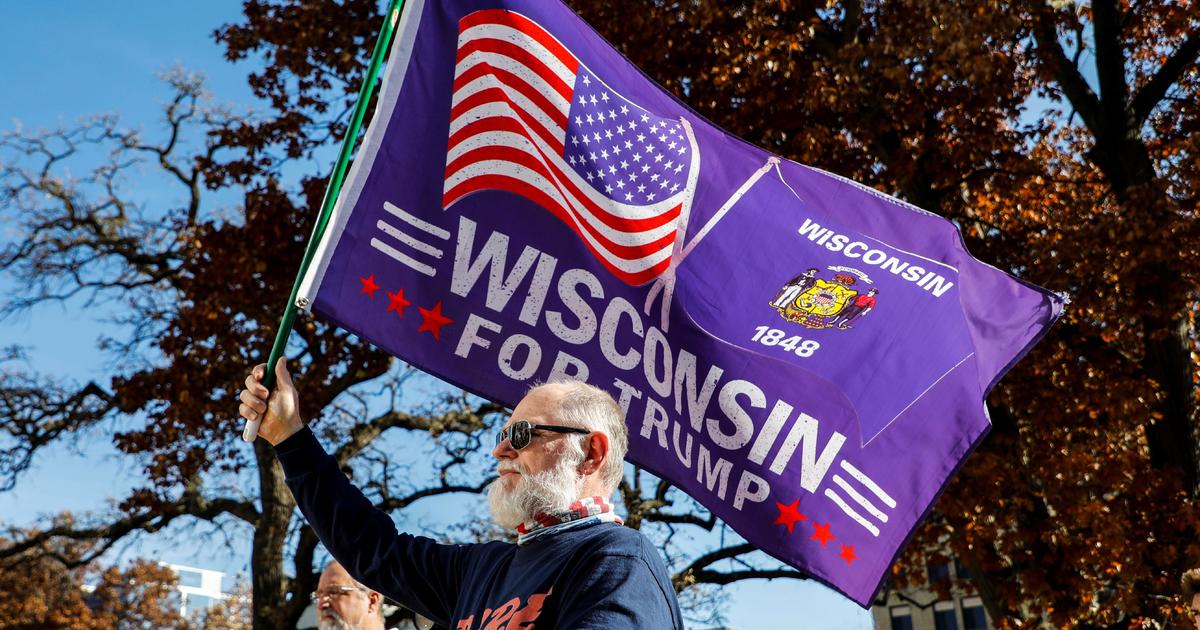The Wisconsin Supreme Court denied the Trump campaign’s attempt to bypass lower courts in the state and go directly to the high court with its election challenge. On Thursday, it ruled against the campaign’s petition for original action with a 4-3 majority composed of the court’s three liberal justices and Justice Brian Hagedorn, a conservative.
The Trump campaign had argued that the Wisconsin Supreme Court should hear its case directly because presidential electors will soon be casting their votes on December 14. It wants to throw out more than 220,000 absentee votes from Dane and Milwaukee counties, Wisconsin’s two largest Democratic counties. The campaign says those ballots were cast illegally even though many of those voters and election officials followed instructions that have been in place for years. During the recount, election officials in those counties declined to discard those ballots. The state high court said the Trump campaign could file its challenge in a circuit court.
“I understand the impulse to immediately address the legal questions presented by this petition to ensure the recently completed election was conducted in accordance with the law. But challenges to election results are also governed by law,” Hagedorn wrote in a concurring opinion. He noted that the statute says “these actions should be filed in the circuit court” and said the law “spells out detailed procedures for ensuring their orderly and swift disposition.”
“We do well as a judicial body to abide by time-tested judicial norms, even—and maybe especially—in high-profile cases,” Hagedorn wrote. “Following the law governing challenges to election results is no threat to the rule of law.”
Chief Justice Patience Roggensack authored one of the dissenting opinions. She said she would have granted the petition for original action, but referred fact finding to a circuit court. Under that circumstance, the circuit court would have reported its findings to the Supreme Court and justices would then rule on those facts.
“I conclude that we have subject matter jurisdiction that enables us to grant the petition for original action pending before us. Our jurisdiction arises from the Wisconsin Constitution and cannot be impeded by statute,” Roggensack wrote. “Furthermore, time is of the essence.”
But she also suggested she might not have agreed with the Trump campaign’s request to throw out absentee ballots where clerks filled in missing witness address information or votes cast during early in-person absentee voting. The advice from clerks may not have been lawful, she said, but that doesn’t mean ballots should be tossed.
“If WEC (Wisconsin Elections Commission) has been giving advice contrary to statute, those acts do not make the advice lawful. WEC must follow the law,” Roggensack said. “We, as the law declaring court, owe it to the public to declare whether WEC’s advice is incorrect. However, doing so does not necessarily lead to striking absentee ballots that were cast by following incorrect WEC advice. The remedy Petitioners seek may be out of reach for a number of reasons.”
She said the court could examine the procedures in the complaint and explain where the WEC was correct and where it was incorrect.
Justice Rebecca Bradley, another conservative, wrote in a dissenting opinion that “the majority’s failure to act leaves an indelible stain on our most recent election.” She also said confidence in future elections is on the line.
“While some will either celebrate or decry the court’s inaction based upon the impact on their preferred candidate, the importance of this case transcends the results of this particular election,” Bradley wrote. “The majority takes a pass on resolving the important questions presented by the petitioners in this case, thereby undermining the public’s confidence in the integrity of Wisconsin’s electoral processes not only during this election, but in every future election.”
The Trump campaign filed its notices of appeal from the recounts in Dane and Milwaukee counties on Thursday evening and asked Chief Justice Roggensack to appoint a circuit judge to hear the case. They are asking for a scheduling conference to take place either Friday or Saturday.
“We fully expect to be back in front of the Supreme Court very soon,” Jim Troupis, Wisconsin counsel for the campaign, said in a statement in response to the ruling.
On Thursday night, Chief Justice Roggensack combined the Dane and Milwaukee County cases. She assigned retired Racine County Judge Stephen Simanek to preside over the case.
In another case Thursday, the Wisconsin Supreme Court in a 4-3 decision denied a petition for original action from a Wisconsin resident who is challenging the election results. Part of the challenge focused on the legality of absentee ballot drop boxes. The plaintiff said if the court found ballot drop boxes illegal, there should be another election before December 14 or the Wisconsin State Legislature should appoint its own 10 electors for president.
As in the Trump campaign case, three liberals and swing justice Hagedorn made up the majority. The three other conservative justices dissented and said simply, “This court cannot continue to shirk its institutional responsibilities to the people of Wisconsin.”
In April, Jill Karofsky, a liberal, defeated Trump-endorsed conservative Dan Kelly for a seat on the state’s high court. Karofsky’s victory narrowed the conservative majority from 5-2 to 4-3.
Mr. Trump also has a case pending in federal court challenging the Wisconsin election results. And there is one other lawsuit filed by a conservative group that the Wisconsin Supreme Court hasn’t weighed in on yet. Another federal lawsuit has also been filed by lawyer Sidney Powell. On Thursday, that lawsuit removed former Republican congressional candidate Derrick Van Orden from the list of plaintiffs. He said earlier this week that he had never given Powell permission to use his name in the suit.
